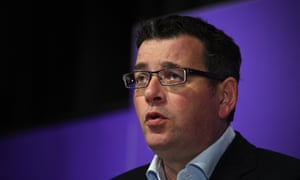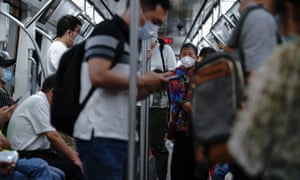Back to Australia: The Victorian premier, Daniel Andrews, has also given some guidance on restrictions.
On Friday, the national cabinet agreed that under step three of the national guidelines, states could possibly remove the 100 person cap for venues and implement a one person per four square metre rule instead. Meaning that some larger venues could have more than 100.

Andrews said Victoria was still “testing” whether this would work for venues in the state. And that the national cabinet could still alter that rule.
“That work will be done over the next fortnight and when we next meet as a national cabinet, a fortnight from last Friday, we will make a decision or not, but that matter is being tested, if you like,” he said.
“Because I know that there are a number of pubs, for instance, a number of venues where there is no way of getting 50 patrons in but enclosed space because the room simply isn’t big enough, from a square metre point of view.”
He also said that electronic gambling could be back by 20 July.
“Electronic gaming, that is still some way off, and you will see in the release that we have foreshadowed the 20th of next month.
“It is probably longer than the industry would have liked, but it is important to be cautious about this. It will not be electronic gaming as we know it. It will be spacing, there will be not necessarily every machine, all that is to be worked through.”
The Australian government’s push for economic talks among finance ministers from countries in the Five Eyes intelligence-sharing alliance remains vague, with no details yet about the frequency of meetings or their agenda.
But some experts have argued the move to coordinate economic policies with Australia’s traditional security partners reflects a “very deep misunderstanding” of our modern economic interests given the group excludes Asia and most of Europe.
The government indicated this week that Australia had secured support from the other countries in the Five Eyes pact – the United Kingdom, United States, Canada and New Zealand – to hold “regular” meetings to coordinate economic responses during the Covid-19 pandemic.
The existing intelligence-sharing arrangement has its origins in the 1940s – and during the Cold War was focused on the Soviet Union – but over time the cooperation between partners has broadened beyond signals intelligence to include issues such as terrorism, organised crime, law-enforcement and borders:
In addition to 50 people being allowed in cafes, restaurants and pubs and patrons being allowed to consume alcohol without a meal, restrictions on some community sports will be eased.
Victorian health minister, Jenny Mikakos, also said that non-contact community
sport would return on 22 June – for both adults and kids, both indoor and outdoor.
Under 18s will be able to play competitively with full contact from 22 June, while adults will be able to train with contact from 13 July, then resume with full contact competition from 20 July.
Victoria, Australia announces nine new cases
The state of Victoria, Australia has announced nine new cases of coronavirus today, three of whom are in hotel quarantine.
One person contracted the virus from an unknown origin, and that is being investigated. Five cases are linked to two known outbreaks, including an outbreak linked to a GP who tested positive.
“The GP worked at three different clinics but did absolutely the right thing,” the health minister, Jenny Mikakos, said. The doctor was tested and stopped working while waiting for results.
Mikakos said they expect six new hotel quarantine cases each day in the state, as residents return home.












